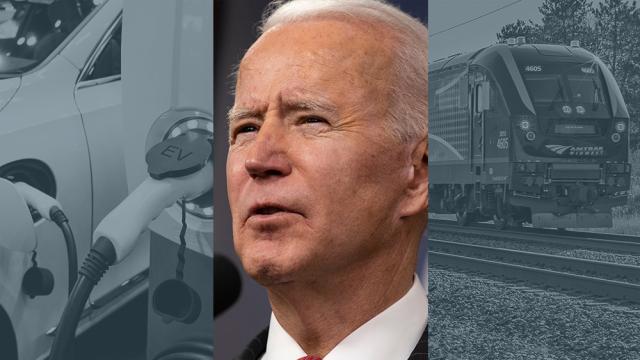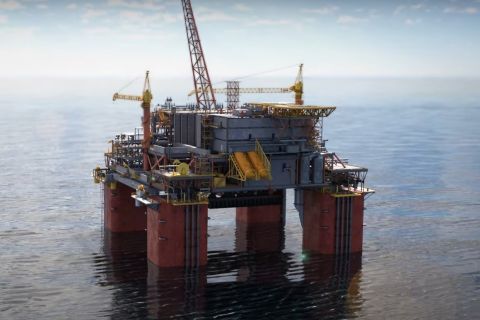
Charging of an electric vehicle, President Joe Biden, an Amtrak train. (Source: buffaloboy, BiksuTong, Focused Adventures/Shutterstock.com)
WASHINGTON—President Joe Biden’s vast infrastructure plan includes $174 billion to boost the markets for electric vehicles and billions more for renewable power—both provisions aimed at weaning the U.S. off of fossil fuels and combating climate change.
The $2 trillion plan, which also seeks to invest in traditional projects like roads and bridges, is a centerpiece of the administration’s ambitious agenda to decarbonize the U.S. economy by 2050 and restore the nation’s leadership in addressing global warming.
It also vows to spend $165 billion on public transit, Amtrak and other rail projects—moves that could shift more Americans out of private cars and onto trains and transit systems.
The plan still must be approved by Congress.
The White House said the new EV funds will result in more U.S. production of EV components and batteries and fund new consumer rebates and tax incentives “to buy American-made EVs, while ensuring that these vehicles are affordable for all families and manufactured by workers with good jobs.”
The Biden plan proposes grants and incentives “to build a national network of 500,000 EV chargers by 2030.” It also calls for replacing 50,000 diesel transit vehicles and electrifying at least 20% of school buses and $20 billion to improve road safety.
But it does not follow California’s lead in setting a date to phase out gasoline-powered vehicles.
It also calls for $25 billion for U.S. airports and to “utilize the vast tools of federal procurement to electrify the federal fleet, including the United States Postal Service.”
The proposal seeks to extend tax credits for wind, solar and energy storage facilities by 10 years, driving down the cost of the technologies for energy buyers. The plan will also leverage the government’s purchasing heft and require that federal facilities be powered around the clock with carbon-free sources.
It also calls for $15 billion for projects that demonstrate emerging energy technologies like carbon capture and storage, advanced nuclear and hydrogen.
At the same time, the plan vowed to do away with subsidies and tax loopholes for fossil fuel companies and to require polluters to pay into a fund for environmental cleanup.
To assist workers displaced by the transition away from fossil fuels, the plan also includes $16 billion to employ hundreds of thousands of workers to plug orphan oil and gas wells and clean up abandoned mines.
Recommended Reading
Galp Seeks to Sell Stake in Namibia Oilfield After Discovery, Sources Say
2024-04-22 - Portuguese oil company Galp Energia has launched the sale of half of its stake in an exploration block offshore Namibia.
Deepwater Roundup 2024: Offshore Australasia, Surrounding Areas
2024-04-09 - Projects in Australia and Asia are progressing in part two of Hart Energy's 2024 Deepwater Roundup. Deepwater projects in Vietnam and Australia look to yield high reserves, while a project offshore Malaysia looks to will be developed by an solar panel powered FPSO.
Texas Earthquake Could Further Restrict Oil Companies' Saltwater Disposal Options
2024-04-12 - The quake was the largest yet in the Stanton Seismic Response Area in the Permian Basin, where regulators were already monitoring seismic activity linked to disposal of saltwater, a natural byproduct of oil and gas production.
US Raises Crude Production Growth Forecast for 2024
2024-03-12 - U.S. crude oil production will rise by 260,000 bbl/d to 13.19 MMbbl/d this year, the EIA said in its Short-Term Energy Outlook.
NAPE: Chevron’s Chris Powers Talks Traditional Oil, Gas Role in CCUS
2024-02-12 - Policy, innovation and partnership are among the areas needed to help grow the emerging CCUS sector, a Chevron executive said.


